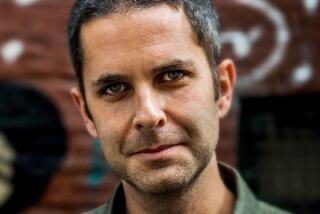Travels in the Hostile Territory of a Marriage
- Share via
“Lifestyles of the bitch and famous” would have made a fine alternate title for Frederic Raphael’s biting new novel, “Coast to Coast.” American expatriate Raphael has produced an astounding amount of work in different genres: novels (including “California Time,” “Richard’s Things,” “After the War”), short stories (three collections), biographies (“Byron,” “Somerset Maugham and His World”), translations (Euripides, Aeschylus, Catullus) and screenplays (including “The Glittering Prizes,” “Two for the Road,” “Far From the Madding Crowd,” “Darling”).
Living in Europe for years now, Raphael has absorbed the fine, jaded British ear for wit. “Coast to Coast” may be the story of an American family, but it feels completely un-American. Raphael leaves no room for sentiment, innocence, romanticism or any hope for redemption that one finds in most American writing. Even our most astute or cynical social observers--Tom Wolfe, Don DeLillo, Carolyn See--operate from an angle that contains a smidgen of optimism. Raphael’s writing resonates with Old World weariness. It is punctuated with barbs, ultra-quick one-liners and small riffs of dialogue that resemble the utter nastiness of Oscar Wilde and Virginia Woolf.
“Coast to Coast” resembles “Two for the Road” and “King Lear” with “The Honeymooners” thrown in for good measure. We laughed when Ralph Kramden threatened his wife (“To the moon, Alice, to the moon”), knowing the big, lumbering guy wouldn’t hurt a flea. But the unrelenting hostility that flows between Marion and Barnaby Pierce feels malignant, dangerous, destructive. Somebody is going to die here, you feel from Page 1. To the moon.
Barnaby is an obscenely successful sitcom writer, living in an upscale suburb somewhere back East. He and Marion are the parents of equally nasty children. Stacey lives with a basketball star in Minneapolis; Zara teaches in California; and Benjamin is an overpaid TV executive in Hollywood who is about to be married and has just bought a house in the hills for $1.5 million. There was another son, Christopher, killed years before in an auto accident. His death is an ever-present, never-discussed horror that has encircled Marion and Barnaby like a choking kudzu vine.
They can barely breathe in each other’s presence without getting into an argument. They accuse each other of infidelity. (Both have had lovers.) They torment each other over parenting issues, love, sex, career and values. All these years, Marion has felt cheated of any identity outside of being a wife and a mother of kids who practically hate her. She wants to be free of her large home, her witty, arrogant husband and her children. She wants to go back to school and become a therapist. Meanwhile, Barnaby doesn’t want to sell the house or lose Marion, who is still “all the women in the world” to him. As much as he tears things apart, he tries to keep them together.
Before splitting up, Barnaby and Marion agree to drive their gorgeous old Jag cross-country to give to Ben--who has always coveted this car--as a surprise wedding gift. On the way, they agree to drop in on acquaintances and family--including two lovers of Marion’s from long ago. At different stops they are met by infidelity, cruelty, deceitfulness and death.
Visiting their daughter in Minneapolis, they admire the converted granary in which she lives.
“ ‘Now I know,’ Barnie said, ‘Why Minneapolis. Now I know.’
“ ‘You know that much.’ Stacey squeezed a small space between thumb and forefinger.
“ ‘We only just got here,’ Barnie said, ‘and already we don’t know everything.’ ”
Raphael’s writing, mostly all dialogue, is often exhausting, dense and bewildering. Clever as it is, most characters sound alike, so it’s hard to follow who is saying what. At times the language gets so baroque you can’t understand a word of it. Marion “was looking at [Barnaby] again with that flat meaningless look that meant something she was never going to tell him exactly what it was.”
At best, “Coast to Coast” shows off Raphael’s gift for capturing with brilliance the spiteful things we say to one another. At worst, it’s a vision of a world where nobody, not even a newborn, would be innocent of deceit, selfishness and egocentricity.
More to Read
Sign up for our Book Club newsletter
Get the latest news, events and more from the Los Angeles Times Book Club, and help us get L.A. reading and talking.
You may occasionally receive promotional content from the Los Angeles Times.







